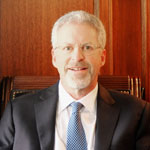How did you end up with a dual focus in engineering and business?
Rodney Freeman: From the time I was a teenager, I wanted to build bridges and skyscrapers, and that got me into civil engineering. When I got into my junior year at Duke, I was doing structural analysis, essentially calculations on things like whether a single bolt would shear within a large bridge. I began to ask myself, “Is this the kind of detail I want to get into for the rest of my life?” Duke had a three-two option whereby students could join the business school their senior year. I got in, so my fourth year at Duke became my first year of business school. I graduated with a bachelor’s in civil engineering and a master’s in business administration.
Merck at a Glance
Location
Whitehouse Station, NJ
Founded
1891
Employees
82,000
Specialty
Pharmaceuticals
How did you begin using that education?
RF: It got me into manufacturing as a management associate with Schering-Plough. Seventeen years later, in 2009, Schering-Plough merged with Merck. When I got to Merck, I was offered the opportunity to lead global facilities management, which spans 450 projects globally.
You had a role in the implementation of the company’s integrated facilities-management (IFM) program, correct?
RF: I expanded it. Merck had just launched its program in certain areas, but it wasn’t extensive. Now, my team has taken it around the globe to all offices and research sites.
It’s a program that many companies across different industries utilize to manage their day-to-day facilities activities. A large partner in the facilities-management business comes in and manages your day-to-day work. For instance, at Merck, we used to have an employee who would oversee security, groundskeeping, and janitorial work using contractors. When we brought in our IFM partner, Jones Lang LaSalle, we handed over that management to them. Now we only pay one bill, to Jones Lang LaSalle, and they handle all the contractors and the day-to-day management of our facilities.

What were the biggest challenges of implementing the program?
RF: Any time you’re in a highly regulated environment and you outsource, you have to do it with caution and care. But the biggest hurdle was the people. We moved a lot of people over to our partners like Jones Lang LaSalle. That was hard. We were saying to people who had been experts at Merck for years, “Now we’re going to have an outside provider to do your work, and you’ll have an opportunity to work with that provider.” But I’m happy to say that over the past three years we’ve gotten better and better with the people transition and have provided more transparent communication and improved change management. Now, when you go back and interview individuals who have gone across, we get positive feedback as to how it was handled and what the end results were.
How has your dual-focus background helped you in your current role?
RF: Each and every day my education in engineering and business helps me. Having an engineering background is key to being able to understand my experts and for them to feel like I’m getting what they’re saying to me. It gave me analytical capabilities, whether I’m talking to an engineer or an accountant. Because of that, even though I don’t touch civil engineering on a daily basis, I’d still get the degree again if I had the chance to do it over. As for my business background, it taught me to see the bigger picture. That’s important because I have to make sure what I’m doing will be right for the corporation, not just for my group. I also have to understand the interdependencies in the corporation.
What advice would you give others implementing an IFM program?
RF: Major outsourcing programs are not pure procurement plays. You’re not going in just to save money for the company. In order for outsourcing to be successful, you have to have a robust governance process and fully partner with your service provider. That means you can’t go in, hand over the operations you’re outsourcing, and wash your hands of them. You have to stay fully involved. If you don’t, your program will fail. ABQ



